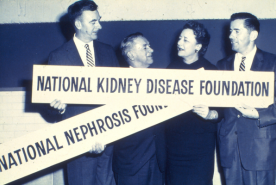September 03, 2024
No one likes to think about end-of-life planning, but it is a necessary part of life that helps you prepare for the future. If you have kidney disease, are on dialysis, or have a transplant, an advance directive helps ensure your treatment decisions are respected, even if you are unable to make those decisions in the moment. Wills ensure your final wishes are followed after you pass.
Keep reading to discover more about advance directives and wills and how to create your own.
What is an Advance Directive?
Advance directives outline any health or medical desires you may have should you be unable to make those decisions yourself. Advance directives can also name a surrogate who has the legal power to make healthcare decisions on your behalf.
For someone affected by kidney disease, this could involve clarifying treatment preferences in the event of a sudden health crisis, including pain management decisions, the use of life-sustaining treatments, and the specification of end-of-life care like palliative care or hospice.
Advance directives that comply with your state law are legally binding documents that don't require a lawyer or notary.
Learn more about advance directives.
Who should have an Advance Directive?
Life doesn't always go as planned. Unexpected illnesses and accidents can happen at any time. Everyone should have an advance directive as a precaution.
An advance directive is also helpful to those who have kidney disease, who are on dialysis, or have a transplant.
There are two types of advance directives:
- Living Will: A written document that specifies the types of medical treatment you want should you become unable to make decisions yourself.
Healthcare Proxy or Durable Health Care Power of Attorney: A person you name to make medical decisions on your behalf.
Advance directives should be updated as life circumstances and treatments change.
What If I Don't Have an Advance Directive?
Several things can happen if you don't have an advance directive and cannot make healthcare decisions for yourself.
- State Laws: Your state's laws usually provide a hierarchy of individuals who can decide for you. It usually starts with a spouse or domestic partner, followed by adult children, parents, and other close relatives.
- Court-Appointed Guardianship: If no one is available to make your health care decisions, the court may appoint a guardian or conservator to decide on your behalf. This process can be time-consuming and may not always result in someone you would have chosen making the decisions.
- Medical Decision-Making: Medical professionals can also be put in charge of your care. They do what they believe is in your best interest and what is considered reasonable for your condition.
What is a Will?
A will, also known as a last will and testament, is a legal document that outlines how you would like your estate distributed after death.
Once you pass away, your will goes through probate, a legal process that validates the will's authenticity and determines how to administer the estate.
- Validation: The court validates the will by checking that the person signing was of sound mind when the will was drafted.
- Naming an Executor: A person is named in the will to help execute the will. They compile a list of all assets, including real estate, bank accounts, and personal property.
- Distribution: The estate pays outstanding debts or taxes before the assets are distributed per the will instructions. The executor submits a final accounting and closes the account.
Not all assets go through probate, though. You'll need to name a beneficiary for assets like IRAs, 401(k)s, and life insurance policies not included in your will. With a beneficiary named, these assets are usually distributed quickly.
Who Should Have a Will?
Anyone with assets, children, pets, or charitable intentions should have a will.
- Assets: You worked hard for your property, savings, and personal items. A will helps ensure your assets go to the people you care about.
Children: Losing a parent or guardian is one of the most difficult things a child can go through. Should that happen, a will assures your children are cared for by the people you choose instead of the courts making that decision.
Pets: Place your pet in the care of a trusted friend or family member in the event of your death.
Charity: Outlining your wishes can help prevent familial disputes and ensure your donations make it to your chosen charity.
By preparing for the future now, you can minimize potential familial disputes, ensure your loved ones are cared for, and simplify the legal process of distributing your estate.
Making a will may sound daunting, but you can create one in twenty minutes at no cost. National Kidney Foundation partnered with FreeWill to bring you access to their trusted will-building platform. Create a will and name your beneficiaries.
What if I Don't Have a Will?
Dying without a will means you have died in intestate. Your state or national intestacy laws choose how to distribute your assets.
In many states, surviving spouses and children are typically the first to inherit. If you have no surviving spouse or children, the estate might be divided among other close relatives like siblings, nieces, and nephews. If no close relatives are alive, the estate could go to more distant relatives. It could also be escheated or given to the state or government if there are no legal heirs.
Build a Legacy
By including NKF in your end-of-life planning, you can create a legacy of hope for those affected by kidney disease. There are seven gift-type options to choose from–many that also offer tax benefits. After your gift is planned, you’ll gain access to NKF's Legacy Society, insider reports on NKF's impact on kidney health, and invitations to special NKF events.









